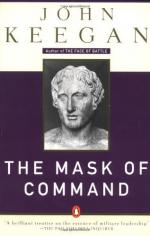
|
| Name: _________________________ | Period: ___________________ |
This test consists of 15 multiple choice questions and 5 short answer questions.
Multiple Choice Questions
1. How long did Wellington spend in India?
(a) Eight years.
(b) Four years.
(c) Thirteen years.
(d) Three years.
2. During the early morning hours, Wellington took time to write his dispatch, which would later appear in its entirety where?
(a) In the New York Times.
(b) In the London Chronicle.
(c) In the Paris Post.
(d) In the London Times.
3. How was Alexander toward his men?
(a) Cold and uncaring.
(b) Generous and caring.
(c) Neutral and fair.
(d) Mean and hateful.
4. Technically, the victory in battle meant that Alexander was now what?
(a) The ruler of the world.
(b) The ruler of Macedonia.
(c) The ruler of Indo-Europe.
(d) The ruler of Persia.
5. Alexander had a select infantry known as _______________, whose main job it was to surround and protect Alexander.
(a) The Elite.
(b) The Secret Service.
(c) The Shield Bearers.
(d) The Body Guards.
6. The closest tally of battles and sieges reached included _____________ battles and eight sieges, not counting those Wellington participated in as a subordinate.
(a) Ten.
(b) Sixteen.
(c) Four.
(d) Eight.
7. What war did an uprising in Spain and Portugal against the French emperor later become?
(a) The European War.
(b) The English Civil War.
(c) The Peninsular War.
(d) The Spanish Civil War.
8. It was ______ months later before Alexander and Darius met again.
(a) Two.
(b) Ten.
(c) Five.
(d) Eight.
9. Aristotle would become known as one of the world's most brilliant philosophers and the founding father of ___________.
(a) Umpiricism.
(b) Empiricism.
(c) Democracy.
(d) Globalization.
10. The most important battle of Wellington's life would turn out to be the __________ day battle at Waterloo.
(a) Two.
(b) Three.
(c) Four.
(d) Five.
11. The author states that the only things that saved Wellington from sure death were his superior riding skills and the presence of __________________, his prize steed.
(a) Copenhagen.
(b) Paris.
(c) Frankfurt.
(d) Stockholm.
12. How did Wellington dress when going into battle?
(a) Like a French commanding officer.
(b) Like an American soldier.
(c) Like a commanding officer.
(d) Like a civilian.
13. At age ___________, Alexander went to war under Philip's command for the first time.
(a) Eighteen.
(b) Sixteen.
(c) Twenty.
(d) Twelve.
14. To what did the French set fire?
(a) A barn.
(b) A chateau.
(c) A textiles plant.
(d) A large business.
15. Unlike ________________, Wellington rode alongside his men as they charged into battle.
(a) Attila the Hun.
(b) Napoleon.
(c) Grant.
(d) Alexander.
Short Answer Questions
1. What ideas of Wellington impressed Castlereagh?
2. Many of the soldiers were considered to be ___________ by Alexander.
3. What is the major difference between Wellington and Napoleon regarding battle?
4. What was the name of Alexander's famous horse?
5. Even with _________________ soldiers, Darius was unable to outsmart Alexander, who perfectly executed a plan to attack Darius from the rear rather than wait to face the ruler head on at Cilicia.
|
This section contains 478 words (approx. 2 pages at 300 words per page) |

|




